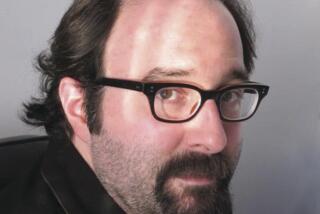BOOK REVIEW / FICTION : A Sci-Fi History of WW II Offers a New Take on an Old Story : 1945: A Novel <i> by Newt Gingrich and William Forstchen</i> ; Baen Books $24, 382 pages
- Share via
Any pulp junkie knows that most sub-genre fiction has conventions as rigid as those of the Comedie Francaise.
Romance editors send aspiring writers of “erotic historicals” style sheets specifying the amount and variety of sex appropriate from bodice rippers, as opposed to “Mandingo” clones. Science fiction sub-genres, less tightly defined, include space opera, first contact novels, sword and sorcery, future history, alternate history, feminist SF, military SF and a lot of others.
Then there are crossover books, which is what Newt Gingrich and William Forstchen (G&F;) have written: “1945” is alternate history/military SF. Discriminating pulp junkies should be advised that the novel, while sometimes ingenious and occasionally half-smart, is in the end bad alternative history and worse military SF.
Their pivotal moment is promising; “1945’s” history is the same as ours until Dec. 6, 1941, when the Fuhrer is injured in a plane crash. Pretty good choice: Hitler’s most easily avoidable blunder was declaring war on the United States. G&F; put Goering, Goebbels and Halder in charge for the next critical weeks, and they ignore Pearl Harbor, and order what G&F; believe to be life-saving strategic withdrawal along the Russian front.
Then the triumvirate temporarily reins in the SS, and 39 divisions of Ukrainian and Russian collaborators promptly join up. (Well, maybe, although in reality most Soviet citizens fought for Stalin with a loyalty as staggering as it was undeserved.)
And next? Without U.S. aid, “The result was inevitable”; the Soviets “threw in the towel in 1943,” accepted an armistice, and kept the gulag going behind the Urals. (This is bad history: In fact, the Soviets had stalemated and indeed begun to defeat the Wehrmacht without much U.S. aid, and Hitler didn’t want to offer the Russians armistices--he wanted to enslave and exterminate them.) In the same year, Churchill’s government falls, Britain agrees to an armistice too, and we beat Japan.
All of this is revealed parenthetically, for “1945” opens in September, 1945. The Germans have spent two years building airplanes. When a White House aide reveals the Manhattan Project during pillow talk with a German spy, Hitler dispatches Otto Skorzeny with paratroopers who have orders to bomb, strafe and storm Oak Ridge and Los Alamos.
A good Navy man figures it all out, in spite of boneheaded and sometimes malevolent federal bureaucrats, and a posse of good ol’ boys packing deer rifles and led by Sgt. York rout the Nazis. But it’s just a smidgen too late, so we have to face Hitler with no A-bomb.
Then Rommel lands in Scotland with three divisions, and the invasion of Great Britain is under way; the main cross-Channel effort will inevitably succeed, the new Churchill government being plucky but outgunned in the air. Our President refuses to allow Churchill to interdict the German armada; he needs to stage manage a German “surprise” attack to get the United States into a war (a transmigration of the “FDR knew about Pearl Harbor” canard).
Fortunately, a brainstorming session in the White House leads to a “New Paradigm.” Good Americans design an off-the-shelf high-tech air force to intervene in, and no doubt win, the Second Battle of Britain.
So there’s no plausible chain of consequences. With “1945,” however, G&F; have restored the Cold War’s master narrative, and then some. Their Soviets play no excessive role in defeating the Third Reich; instead, they continue to collaborate with it. G&F; are pretty miserly about sharing the glory of beating Hitler, even begrudging England its finest hour: The re-fought Battle of Britain will be a defeat--we’ll have to save them.
This alternate history, then, is not very alternate--it is a revision of real history to restore and perfect a previous mythic history. The implications are suggestive: The darker consequences of Russian victory are gone with the Red army’s dear-bought glory.
No communist regimes will emerge in Gingrich’s postwar Europe, so Roosevelt, whom Gingrich seems to like, will not be guilty of Yalta, and all the more, Yalta will not be sadly inevitable. The Good War? Hell, the best war ever invented. Forgoing not only logic but tragedy, “1945” is neither a cautionary tale like Sinclair Lewis’ “It Can’t Happen Here,” (Dutton, 1970) nor an allegory like John Hersey’s “White Lotus” (Random House, 1990).
It is, however, oddly reminiscent of Norman Spinrad’s “The Iron Dream,” (Avon, 1972) which purported to be a pulp novel by Adolf Hitler, a failed painter in a peaceful mid-20th-Century Europe.
Spinrad’s simple joke was that of an historical fantasist neutralized by a harmless outlet; alternate historian as garden variety SF hack. Gingrich of course, has taken up hack writing after going into politics, and this display of his historical imagination may be illuminating about his chances in the day job. Those chances look good, if not cheering; inventing a fantastical past as a signpost to an incredible future, he may be the true heir to the narcotic politics of Ronald Reagan’s dreamy self-deceits: Tell it like it was, even if it wasn’t.
More to Read
Sign up for our Book Club newsletter
Get the latest news, events and more from the Los Angeles Times Book Club, and help us get L.A. reading and talking.
You may occasionally receive promotional content from the Los Angeles Times.







